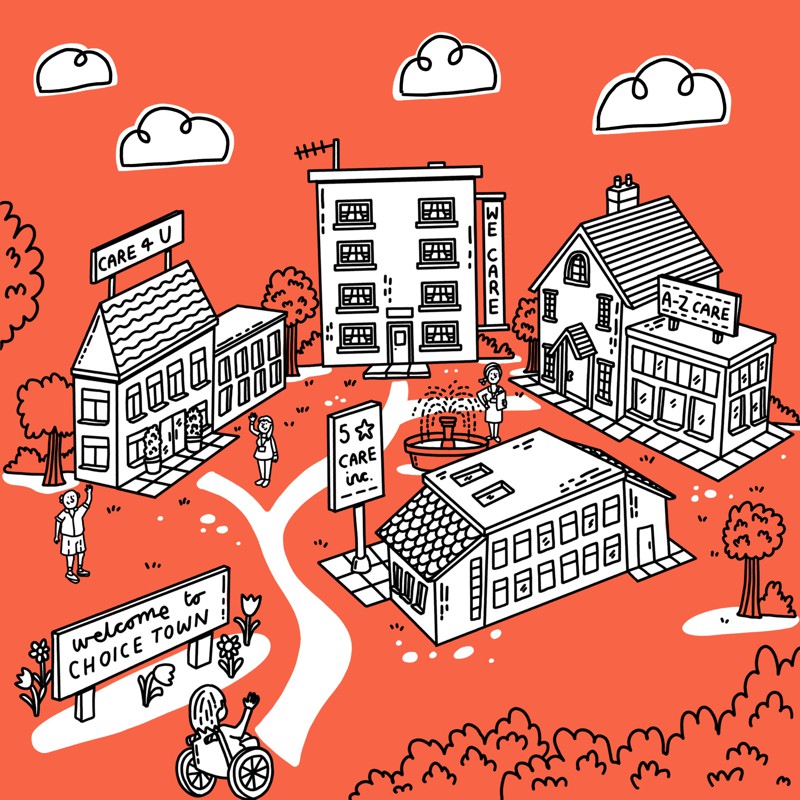
Housing
Some see housing as distinct from Social Care, but we see them as inextricably linked. At a basic level we all know from personal experience that our environment effects our wellbeing. For some recipients of Social Care services, living in the right environment is essential. If you are autistic and have learning difficulties, for example, your environment has a significant impact on your behaviour. We contend that Social Care services are most effective when delivered holistically, and that housing is an important part of the holistic whole.
A lack of strategic direction and difficult market dynamics determine that that is a constant shortage of the right accommodation in the right places. Many recipients of Social Care services fund accommodation through Local Housing Allowance, but rates have not tracked with housing costs, so finding appropriate and affordable housing has become difficult in many areas. The residential care model includes housing as part of the package, so some housing is funded by Local Authorities and some by Districts and Boroughs.
Current Issues & Problems
Housing type
We know that accommodation is central to quality of life, and that our environment shapes our behaviour. Yet the quality and suitability of housing for many people in need of social care or support is lacking. There are some registered care environments which are no longer fit for purpose, and there are people being supported in community accommodation which also fall short of the standard we expect today.
Accommodation constraints often present a challenge to the delivery person centred care and increase the impact of the people impacting each other.
Shortage of appropriate accommodation
We do not have sufficient accommodation of the right type and quality. This has been exacerbated in recent years as funding pressures have compelled organisations to limit investment in maintenance and development.
Funding
In a time of property price inflation, it becomes a financial challenge for care organisations and others looking to develop properties. Levels of Local Housing Allowance are often insufficient to service debt. This will become an even greater challenge as interest rates increase.
There are also some inequalities in the Local Housing Allowance rules, whereby some care organisations are entitled to claim LHA on behalf of their tenants at a higher rate than others.
Security of tenure
Residents of registered care homes generally have no security of tenure. We are all familiar with the threat that comes to the tenure of private payers as their money runs out. The situation is not much better for people who live in rented accommodation, such as supported living and sheltered accommodation, who often have short-term tenancies with limited notice periods.
Without security of tenure people live with one of their basic human needs unfulfilled.
Housing for support workers
Many care and support workers live in rented accommodation. In recent years they have experienced a real terms reduction in their pay whilst rent increases have outstripped inflation. As a result, accommodation has become increasingly unaffordable. Ultimately, this dynamic will render care and support work unviable for many people.
There is a great need to find affordable housing solutions to support the workers in this sector.
Our Proposal
Our proposal
- Build more. We need to increase the quantity and quality of housing available to people accessing social care services. This requires investment to be stimulated through whatever means possible – favourable funding, tax breaks and planning concessions to name but three.
- Build better by design! Demographic changes determine that we need to plan ahead. We know that the number of older people will increase, so we should be developing flexible and adaptable property which is tailored to their needs. We also know that environment shapes behaviour, so we need to develop bespoke environments to support younger adults.
- Asset optimisation. There is often virtue in supporting people in the family home for as long as possible. However, this is not the best solution for everyone, and high-quality, personalised residential care can also be a good home for many people. There is a societal benefit which flows form supporting people to leave their family homes to enable churn in the property market.
- Guarantee the quality. Apply regulations, standards and audit processes to ensure that all accommodation used by people accessing Social Care services is fit for purpose.
- Making better use of technology. Technology can enable people to live better and more independently, so it needs to be designed into our environments from the outset.
- Security of tenure. Provide better security of tenure to people in care and support settings of all kinds. This means long term residential agreements, certainty about what happens when the money runs out (through insurance?), and new forms of tenancy agreements for supported living and sheltered accommodation.
- Getting it right first time. We need to develop a model based on choice and independence which places people at the centre of the decision-making process, gives people a range of options and puts more value on happiness and independence.
- Allow support to follow the person. Often when people move accommodation, their support arrangements will change too because it is linked to the accommodation. We would like to see a greater ability to secure continuity of care and support where accommodation changes.
- Sort out the funding. Review Local Housing allowance to ensure that it is fairer and is funded at a level which is viable and stimulates investment.
- Take a longer-term economic view. A long-term accommodation strategy for people accessing Social Care needs cross-party support to have a vision that stretches beyond the next election.
(Need to expand – Housing First and other models that allow people to stabilise and reduce the conditionality on accommodation. Family Home feel: using PIE, co-production and engaged with local community.)
Commentary on ‘People At The Heart Of Care’: The Adult Social Care Reform White Paper (published 01/12/21)
text here
Best Practice Share
text here
Our Key Takeaways
text here
